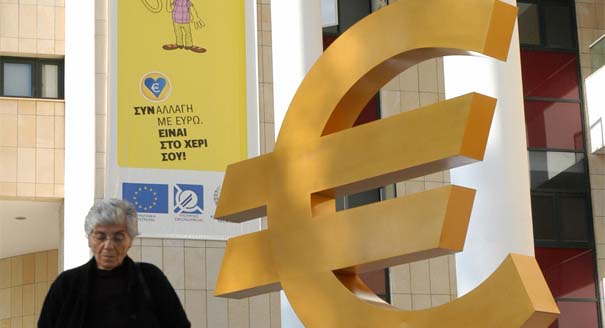When Cyprus joined the EU in 2004, diplomats who negotiated the island’s accession knew two things.
First, it was clear that once Cyprus was admitted, Brussels would lose its leverage to push for a political settlement for the island that has been divided since 1974. That is exactly what happened.
Second, the European Commission was perfectly aware that Cyprus was a haven for money laundering and tax evasion. It naively assumed that this would end once the government in Nicosia had passed the relevant EU legislation. That did not happen.
Now, Cyprus, which joined the eurozone in 2008, is seeking a €17 billion bailout for its banks. That is the equivalent of its total yearly economic output.
Germany is in no mood to rescue Cyprus. Even for Greece, Germany held out a long time—together with some northern EU countries—before agreeing a rescue plan. Greece had to implement a raft of austerity measures in return for receiving bank guarantees. In the case of Cyprus, both Chancellor Angela Merkel, who faces re-election in September, and Finance Minister Wolfgang Schäuble are highly reluctant to write any checks.
It is not just that Merkel fears another backlash from those members of her conservative bloc who opposed a Greek bailout. It is also because of the close financial and banking connection between Cyprus and Russia—and because of the Greek Cypriots’ consistent refusal to agree to a political settlement for the island.
Cyprus is a haven for Russian oligarchs, just as it was for wealthy Serbs during the Yugoslav wars of the 1990s. The Russians have established scores of shell companies in Cyprus, especially since it joined the EU and adopted the euro in 2008.
The Bundesnachrichtendienst (BND), or German Foreign Intelligence Service, recently completed an investigation into Cyprus’s money laundering system and its clients. According to the BND, during 2011 alone about $80 billion of Russian money was channeled through Cyprus. Over $26 billion was deposited in Cypriot banks.
No wonder Merkel and Schäuble oppose the idea of agreeing a rescue package. Why, argue German lawmakers, should Berlin bail out Cyprus’s banks when it would mean protecting illegal Russian money?
“Suspicion arises, and it’s plain to see why: because Russian investment in Cyprus is so high and at the same time Cypriot investment in Russia is high,” Schäuble told German public TV channel ARD last month. “You may ask why Cyprus is the second-largest foreign investor in Russia, and we need clear answers to that,” he added. Indeed.
Schäuble has his own ideas about how to deal with the problem: Russia, which has provided a loan of €2.5 billion to Cyprus, should tighten its own financial market rules. It is hard, however, to see that taking place under President Vladimir Putin. Putin has only ever paid lip service to financial and economic reforms and transparency.
Schäuble also wants the incoming Cypriot government to clamp down on money laundering. But for that to happen, Cyprus would first have to admit that the problem exists. The finance minister, Vassos Shiarly, told Der Spiegel magazine: “Nobody has proved so far that we offend against the rule or even support money laundering.”
So what leverage does the EU have? More than it thinks. Brussels and the member states should adopt a much harder approach to Cyprus. They should consider linking bank guarantees both to real reforms in the banking sector and to a timetable for ending the island’s division.
The need for banking reforms in Cyprus is widely accepted in the EU. But the EU should also consider making use of Cyprus’s urgent need for money to press Nicosia into rethinking its attitude toward the political situation on the island.
Just consider the background: Cyprus, while promising before accession to make every effort to bring about reconciliation with the Turkish half of the island, has made no serious effort since.
On the contrary, it has used its EU membership to get back at Turkey because of Ankara’s support for the Turkish-Cypriot state in the north of the island—a state that no country but Turkey has recognized. Cyprus has blocked the opening of new chapters in Turkey’s accession negotiations, and is hindering the EU and NATO from meeting regularly to discuss security issues such as Kosovo.
Of course, Turkey is also culpable as it seeks to use every possible lever to further its own interests in Europe. But because Turkey is not a member of the EU, Brussels and the member states have many more possibilities to make life difficult for Turkey.
In contrast, up to now, Brussels had no leverage over Cyprus, a very small country that uses its EU membership to wield excessive influence. It is time that EU countries realized that Cyprus’s economic crisis is shadowed by a serious political one.
The EU has made many mistakes in the past with enlargement, especially with regard to Bulgaria, Romania, and Cyprus. This is a unique opportunity to rectify some of them, and set a precedent before Croatia joins in July this year. It is time the EU used conditionality for one of its own members, not just to impose austerity measures, but to press for political progress.






.jpg)